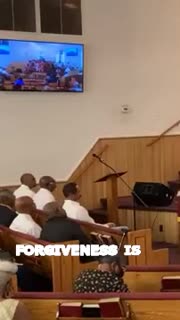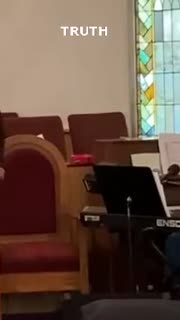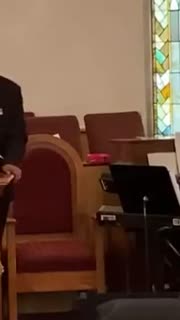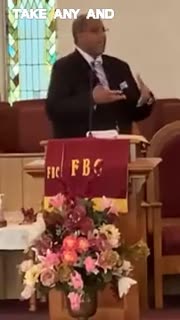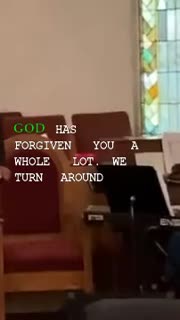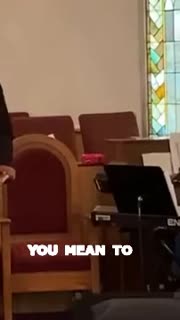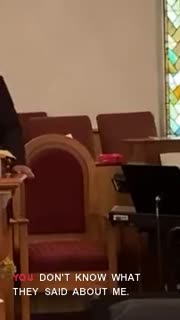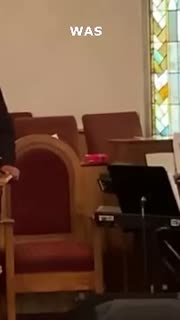Embracing Forgiveness: A Path to Healing and Freedom
Devotional
Sermon Summary
Bible Study Guide
Sermon Clips
### Quotes for Outreach
1. "Forgiveness is necessary because it's the only way to restore that which has been broken. See, without forgiveness, then we'll find ourselves in a position where bitterness will take root, relationships will crumble, and our heart has the opportunity to become harder. And I will tell you that forgiveness is the bridge that allows us to move from pain to healing. Forgiveness is the bridge that allows us to move from separation to reconciliation." [41:46] (37 seconds)
2. "Forgiveness is letting it go, not bringing it back up. But I would also tell you that forgiveness is grand. Sometimes, I have to ask the question, am I just supposed to keep letting you do what doing? Am I just supposed to keep on letting you have the same, or, the same thing? Maybe over and over again." [43:58] (34 seconds)
3. "Truth is, we often hold on to unforgiveness because it gives us, it's a way for us to protect ourselves from being hurt again. Sometimes we think that by holding on to a grudge, that somehow we are ensuring that justice will be done. But the reality is that it traps us in a cycle of pain, and it traps us in a cycle of anger, and it robs us of the peace and the freedom that God has for us." [45:00] (34 seconds)
4. "Forgiveness doesn't mean that we ignore the wrongs that have been done to us. It means that we choose not to be defined by those things. It means that we release the precious understanding that's being released. It's not about that. It's about you." [06:05] (44 seconds)
### Quotes for Members
1. "Forgiveness is not necessarily just allowing you to take any and everything. But forgiveness is not being in a position where, you're just a pushover. Forgiveness is not necessarily just overlooking people's actions just because you or them will attempt to justify their behavior. Yep. But forgiveness is not forgiving. Forgiveness is not avoiding or ignoring a situation. But what it is, is dealing with sin that is real, that is unacceptable, that is inexcusable, and being able to forgive." [43:01] (39 seconds)
2. "God has forgiven you a whole lot. We turn around and won't forgive somebody over a little bit. Joe, sanctify yourself. I got to say that again. God has forgiven us a whole our offense. Jesus is trying to teach us something here about our sin. And if you have the right perspective, it makes it easier to forgive somebody. I didn't say it was easy. I said it makes it easier to forgive somebody else when you understand the great debt that we owe him." [01:02:42] (53 seconds)
3. "You mean to tell me that the Lord has been compassionate with you but yet still you can't extend some form of compassion to other folks? Here's the perspective of those of us who are saved. that we can't recognize the great debt that we've been forgiven and not be willing to forgive others? The debt that we owe to the Lord far outweighs forgiving somebody else for it." [01:05:04] (34 seconds)
4. "You don't know what they said about me. Forgive me. Rev, you don't know how bad they hurt me. Forgive me. Rev, they stole Forgive me. Rev, they lied on me. See, we're afraid that if we forgive we'll let the other person off the hook. But we're afraid that if we forgive that it might happen to us again. We're afraid that forgiveness means forgetting what happened." [01:05:26] (43 seconds)
5. "It was only when the man wouldn't forgive his fellow servant that the king got mad. That was the same verse 34. I ain't never seen the king get mad before verse 34. It was only when he wouldn't forgive somebody else that the king got mad. But here's the warning that you need to have. Verse 35. And I'm going to throw a pair of clothes here. Verse 35 says this is how my heavenly father will treat each of you unless you forgive your brother." [01:10:43] (42 seconds)
Ask a question about this sermon
1. "Forgiveness is necessary because it's the only way to restore that which has been broken. See, without forgiveness, then we'll find ourselves in a position where bitterness will take root, relationships will crumble, and our heart has the opportunity to become harder. And I will tell you that forgiveness is the bridge that allows us to move from pain to healing. Forgiveness is the bridge that allows us to move from separation to reconciliation." [41:46] (37 seconds)
2. "Forgiveness is letting it go, not bringing it back up. But I would also tell you that forgiveness is grand. Sometimes, I have to ask the question, am I just supposed to keep letting you do what doing? Am I just supposed to keep on letting you have the same, or, the same thing? Maybe over and over again." [43:58] (34 seconds)
3. "Truth is, we often hold on to unforgiveness because it gives us, it's a way for us to protect ourselves from being hurt again. Sometimes we think that by holding on to a grudge, that somehow we are ensuring that justice will be done. But the reality is that it traps us in a cycle of pain, and it traps us in a cycle of anger, and it robs us of the peace and the freedom that God has for us." [45:00] (34 seconds)
4. "Forgiveness doesn't mean that we ignore the wrongs that have been done to us. It means that we choose not to be defined by those things. It means that we release the precious understanding that's being released. It's not about that. It's about you." [06:05] (44 seconds)
### Quotes for Members
1. "Forgiveness is not necessarily just allowing you to take any and everything. But forgiveness is not being in a position where, you're just a pushover. Forgiveness is not necessarily just overlooking people's actions just because you or them will attempt to justify their behavior. Yep. But forgiveness is not forgiving. Forgiveness is not avoiding or ignoring a situation. But what it is, is dealing with sin that is real, that is unacceptable, that is inexcusable, and being able to forgive." [43:01] (39 seconds)
2. "God has forgiven you a whole lot. We turn around and won't forgive somebody over a little bit. Joe, sanctify yourself. I got to say that again. God has forgiven us a whole our offense. Jesus is trying to teach us something here about our sin. And if you have the right perspective, it makes it easier to forgive somebody. I didn't say it was easy. I said it makes it easier to forgive somebody else when you understand the great debt that we owe him." [01:02:42] (53 seconds)
3. "You mean to tell me that the Lord has been compassionate with you but yet still you can't extend some form of compassion to other folks? Here's the perspective of those of us who are saved. that we can't recognize the great debt that we've been forgiven and not be willing to forgive others? The debt that we owe to the Lord far outweighs forgiving somebody else for it." [01:05:04] (34 seconds)
4. "You don't know what they said about me. Forgive me. Rev, you don't know how bad they hurt me. Forgive me. Rev, they stole Forgive me. Rev, they lied on me. See, we're afraid that if we forgive we'll let the other person off the hook. But we're afraid that if we forgive that it might happen to us again. We're afraid that forgiveness means forgetting what happened." [01:05:26] (43 seconds)
5. "It was only when the man wouldn't forgive his fellow servant that the king got mad. That was the same verse 34. I ain't never seen the king get mad before verse 34. It was only when he wouldn't forgive somebody else that the king got mad. But here's the warning that you need to have. Verse 35. And I'm going to throw a pair of clothes here. Verse 35 says this is how my heavenly father will treat each of you unless you forgive your brother." [01:10:43] (42 seconds)
